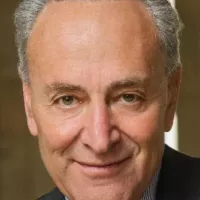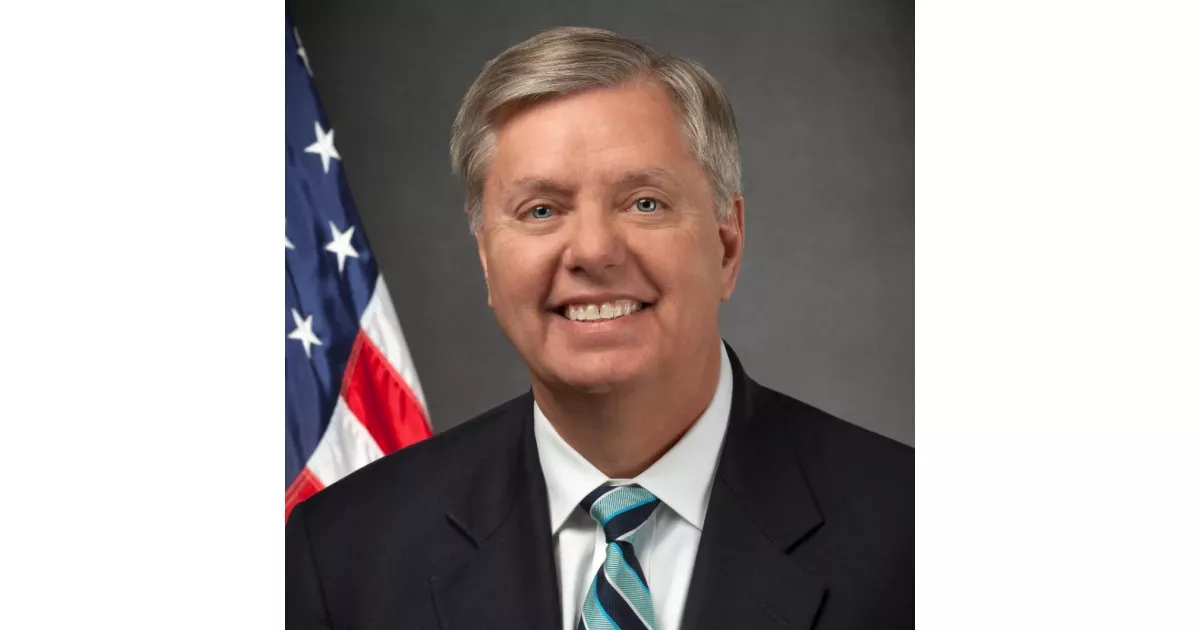Public opinion and media debates around Lindsey Graham—discover key moments of controversy.
Lindsey Graham is an American politician and attorney. He has served as a Republican U.S. Senator for South Carolina since 2003. He notably chaired the Senate Judiciary Committee from 2019 to 2021.
3 hours ago : Lindsey Graham Predicts Cuba Next After Iran Strikes, Regime Collapse Imminent
Senator Lindsey Graham suggests Cuba could be the next target after Iran strikes, claiming the Iranian regime is on the verge of collapse, mentioning Trump's influence.
1996: Voted for the Defense of Marriage Act
In 1996, Lindsey Graham voted in favor of the Defense of Marriage Act (DOMA), which defined marriage as between one man and one woman and disallowed federal recognition of same-sex marriages.
November 1997: Co-sponsored resolution for impeachment inquiry into President Clinton
In November 1997, Lindsey Graham was one of 18 House Republicans to co-sponsor a resolution by Bob Barr that sought to launch an impeachment inquiry into President Bill Clinton.
October 8, 1998: Voted in favor of legislation to open an impeachment inquiry
On October 8, 1998, Lindsey Graham voted in favor of legislation to open an impeachment inquiry into President Bill Clinton. He also voted for three of the four proposed articles of impeachment in both the Judiciary Committee and the full House vote.
1998: Graham's military record was questioned
In 1998, The Hill newspaper questioned whether Graham was misrepresenting his military service as an Operation Desert Shield and Desert Storm veteran. Graham denied making any false claims.
1998: Graham's statements during Bill Clinton's impeachment referenced
In December 2019, during the impeachment of Donald Trump, Democrats referenced statements Lindsey Graham made during the 1998 impeachment of Bill Clinton, including his citation of Richard Nixon as proof that a president who ignored a subpoena should be impeached.
2002: Voted for the Iraq Resolution
In 2002, Lindsey Graham voted in favor of the Iraq Resolution, which authorized military action against Iraq.
November 2005: Graham amendment on detainee rights passes
In November 2005, Graham authored an amendment to a Department of Defense Authorization Act attempting to clarify the authority of American courts regarding detainees. The amendment passed in the Senate despite opposition from human rights groups and legal scholars who contended that it limited the rights of detainees.
2006: Supported Constitutional Amendment Opposing Same-Sex Marriage
In 2006, Lindsey Graham voted in support of a constitutional amendment opposing marriage between same-sex couples, stating his belief in the traditional definition of marriage and the need to protect it through a constitutional amendment.
June 2010: Changed stance on global warming science
In June 2010, Lindsey Graham told reporters that the science about global warming had changed, expressing skepticism and stating that the whole movement had taken a giant step backward.
July 2010: Graham suggests amending birthright citizenship
In July 2010, Graham suggested that the 14th Amendment guaranteeing birthright citizenship should be amended, proposing that children born to illegal immigrants in the United States should be considered illegal immigrants.
2010: Thornton Law Firm reimbursed political contributions
Between 2010 and 2014, the Thornton Law Firm reimbursed political contributions of its partners.
April 3, 2011: Graham suggests action against Koran-burning
On April 3, 2011, during an appearance on Face the Nation, Graham suggested that Congress should take formal action against the Koran-burning by Florida preacher Terry Jones, citing an attack on United Nations personnel triggered by Jones's actions and suggesting limitations on freedom of speech during wartime.
2013: Graham supports NSA phone record collection
In 2013, Graham voiced his support for the NSA's collection of phone records in response to the disclosures about the United States National Security Agency and its global surveillance programs, stating he was "glad" the NSA was collecting phone records.
2014: Thornton Law Firm reimbursed political contributions
Between 2010 and 2014, the Thornton Law Firm reimbursed political contributions of its partners.
July 2015: Called Donald Trump a "jackass"
In July 2015, Lindsey Graham, then a presidential candidate, called Donald Trump a "jackass" for his comments about Senator John McCain, leading Trump to call Graham an "idiot" and reveal Graham's personal cellphone number at a rally.
December 2015: Called Donald Trump a "religious bigot"
In December 2015, Lindsey Graham responded to Donald Trump's call for a ban on Muslims entering the United States by calling him a "race-baiting, xenophobic, religious bigot" and stating that he would "rather lose without Donald Trump than try to win with him."
2015: Reference to the 2015 Conflict
In 2015, Graham and Trump had a conflict, which was later referenced when Graham gave Trump his new phone number in March 2017.
February 2016: Graham calls Trump a 'kook' and 'unfit for office'
In February 2016, Lindsey Graham stated that he thought Donald Trump was a "kook," "crazy," and "unfit for office."
May 2016: Graham tweeted negative statement about Trump
In May 2016, Lindsey Graham tweeted, "If we nominate Trump, we will get destroyed...and we will deserve it."
May 2016: Graham refuses to vote for Trump or Clinton
In May 2016, with Donald Trump likely to become the Republican nominee, Lindsey Graham stated he would not vote for Trump or Hillary Clinton.
June 2016: Graham criticizes Trump's remarks about a judge
In June 2016, Lindsey Graham criticized Donald Trump's remarks about a judge of Mexican heritage, stating that Trump was "playing the race card" and that such attacks were "very un-American." He also suggested that people should reconsider their support of the Republican party if Trump continued this line of attack.
2016: Graham received funds from Thornton Law Firm
In 2016, it was reported that Lindsey Graham was the only Republican recipient of money from a major Democratic donor, the Thornton Law Firm, and was facing scrutiny for questionable campaign donation habits.
2016: Russian interference in the election
In 2016, there was Russian interference in the election
November 2017: Graham criticizes media's reporting on Trump
In November 2017, Lindsey Graham criticized the media's reporting on Donald Trump, expressing concern about the "endless attempt to label the guy some kind of kook not fit to be president."
January 2018: Graham recommends charges against Christopher Steele
In January 2018, Lindsey Graham and Chuck Grassley recommended charges against ex-MI6 officer Christopher Steele, the author of the Steele dossier, for allegedly lying to federal authorities during the investigation into Russian interference in the 2016 election.
August 2018: Graham claims he has never heard Trump make a racist statement
In August 2018, The Washington Post reported that Lindsey Graham stated he had "never heard [Trump] make a single racist statement. Not even close."
October 2018: Graham discusses Supreme Court vacancies
In October 2018, Graham stated in an interview that if a Supreme Court vacancy occurred in the last year of President Trump's term, and the primary process had started, they would wait until the next election to fill it.
2018: Graham defends Kavanaugh during confirmation hearings
In 2018, during Brett Kavanaugh's Supreme Court confirmation hearings, Graham strongly opposed delaying the process due to Christine Blasey Ford's allegations of sexual assault. Following Ford's testimony before the Senate Judiciary Committee, Graham expressed doubt about her recollection of the events.
March 14, 2019: Graham blocks resolution to make Mueller's report public
On March 14, 2019, Lindsey Graham blocked a resolution calling for Robert Mueller's report to be made public, despite it having unanimously passed the House.
May 14, 2019: Graham encourages Donald Trump Jr. to ignore subpoena
On May 14, 2019, Lindsey Graham faced scrutiny, including from Senator Joe Manchin, after encouraging Donald Trump Jr. to ignore a subpoena from the Senate Intelligence Committee.
May 2019: Graham calls for military invasion of Venezuela
In May 2019, Lindsey Graham called for a military invasion of Venezuela to overthrow Nicolás Maduro during the 2019 Venezuelan presidential crisis.
July 2019: Graham visits migrant detention center
In July 2019, Graham visited a migrant detention center in Texas, describing it as "a facility overwhelmed" rather than "a concentration camp," and stating that certain migrants should not be released, regardless of how long they had to stay in the facilities.
July 2019: Graham defends Trump against racism accusations
In July 2019, Lindsey Graham stated that he did not believe Donald Trump was racist and defended Trump's statements about Democratic congresswomen, arguing that the comments were not racist.
October 8, 2019: Graham condemns Trump's decision to withdraw troops from Syria
On October 8, 2019, Lindsey Graham condemned Donald Trump's announcement of an intention to withdraw U.S. troops from northern Syria, stating that Trump was putting the nation and his presidency at risk. The decision also lacked support of key national security advisers.
November 2019: Graham blocks Senate resolution on Armenian genocide
In November 2019, Lindsey Graham blocked a Senate resolution aimed at officially recognizing the Armenian genocide.
December 2019: Graham expresses disdain for Trump's impeachment process
In December 2019, as articles of impeachment against Donald Trump moved to a vote, Lindsey Graham stated he had already made up his mind and would do everything possible to ensure the impeachment would "die quickly" in the Senate.
May 2020: Graham on filling Supreme Court vacancy
In May 2020, Graham stated that the Senate would proceed with confirming a Supreme Court nominee if a vacancy arose before the November election, distinguishing it from the Merrick Garland situation due to party control differences.
August 2020: Graham states rules have changed after Kavanaugh confirmation
In August 2020, Graham said that after Kavanaugh's confirmation, the rules have changed as far as he's concerned regarding Supreme Court nominations.
September 2020: Graham supports immediate vote on Supreme Court nominee
In September 2020, following the death of Supreme Court Justice Ruth Bader Ginsburg, Graham voiced his support for the Senate to immediately vote on President Trump's nominee to succeed her, a stance that The New York Times labeled as a "complete and brazen reversal" of his earlier position.
2020: Graham urges Trump not to concede the election
After major news networks projected Joe Biden's victory in the 2020 United States presidential election, Lindsey Graham advised Donald Trump not to concede. Graham donated $500,000 to Trump's election lawsuits and suggested Republican state legislators invalidate election results to appoint presidential electors for Trump.
2020: Graham calls Georgia Secretary of State about vote counting
During the recount of the 2020 United States presidential election in Georgia, Lindsey Graham called Georgia Secretary of State Brad Raffensperger to discuss vote counting. Raffensperger said Graham suggested disqualifying all mail-in ballots in counties with more signature errors. Graham denied suggesting this.
2020: Graham calls for investigation into voting irregularities
In 2020, after receiving an affidavit from a Pennsylvania postal worker alleging backdating of mail ballots, Lindsey Graham called for an investigation into voting irregularities. The affidavit came from Project Veritas, a controversial organization, and was later recanted by the postal worker.
2020: FBI investigates efforts to overturn the presidential election
In 2020, the FBI investigated efforts to overturn the presidential election
January 6, 2021: Graham acknowledges Biden and Harris as lawfully elected
On January 6, 2021, after being evacuated from the Capitol due to the attack by Trump supporters, Lindsey Graham spoke against delaying the election results, acknowledging that Joe Biden and Kamala Harris were lawfully elected and would become President and Vice President on January 20th.
February 2021: Georgia DA examines Graham's call as part of election probe
In February 2021, The Washington Post reported that Fani Willis, the Fulton County, Georgia district attorney, was examining Lindsey Graham's phone call to Brad Raffensperger as part of a criminal investigation into possible efforts to illegally overturn Georgia's election results.
May 28, 2021: Graham votes against creating January 6 commission
On May 28, 2021, Lindsey Graham voted against creating the January 6 commission.
July 8, 2021: Called Biden's decision a disaster in the making
On July 8, 2021, Lindsey Graham described Joe Biden's decision to withdraw all U.S. troops from Afghanistan as a "disaster in the making".
August 2021: Report: Graham called Biden after the election to revive friendship
In August 2021, The New York Times reported that Lindsey Graham called Joe Biden days after the election to revive their friendship and claimed he had called for a special counsel investigation of Biden's son Hunter to appease Trump supporters. A Graham spokesman disputed the Times's account.
2021: FBI obtained Graham's phone metadata
In 2021, the FBI obtained toll records—which include call times, numbers dialed, and duration, but not call content—covering January 4–7, from Lindsey Graham's phone.
March 3, 2022: Tweeted about Putin's assassination
On March 3, 2022, Lindsey Graham tweeted in response to the Russian invasion of Ukraine, suggesting that someone in Russia should "take this guy out", referring to Vladimir Putin, which drew backlash and condemnation.
August 2022: Comments on Same-Sex Marriage Bill
In August 2022, after the House approved a bill to recognize same-sex marriages at the federal level, Lindsey Graham stated that states should decide the issue of marriage, opposing federal government intervention in defining marriage.
September 2022: Graham introduces federal abortion ban legislation
In September 2022, Graham introduced legislation to institute a federal ban on abortion after 15 weeks of pregnancy, with exceptions for rape, incest, and the life of the patient, stating it's a human rights issue requiring a national minimum standard.
2022: Reiterated support of the Defense of Marriage Act
In 2022, Lindsey Graham reiterated his support for the Defense of Marriage Act (DOMA).
May 26, 2023: Controversy over edited video remarks
On May 26, 2023, the Office of the President of Ukraine released an edited video showing Lindsey Graham remarking that "the Russians are dying" and that American military assistance to Ukraine was the "best money we've ever spent," sparking criticism and prompting the release of an unedited version of the interview.
May 29, 2023: Arrest warrant issued by Russia
On May 29, 2023, the Russian Interior Ministry issued an arrest warrant for Lindsey Graham due to his comments about the war, to which Graham responded with "immense joy" and stated he would "wear the arrest warrant issued by Putin's corrupt and immoral government as a Badge of Honor".
April 2024: Graham criticizes Trump for not supporting federal abortion ban
In April 2024, Lindsey Graham criticized Donald Trump for not supporting a federal abortion ban. In response, Trump expressed regret for endorsing Graham in his 2020 Senate campaign.
May 1, 2024: Conference call with ICC Prosecutor
On May 1, 2024, Lindsey Graham participated in a conference call between U.S. senators and Karim Ahmad Khan, the Prosecutor of the International Criminal Court, during which Graham allegedly made controversial remarks regarding potential arrest warrants for Israeli leaders and the court's jurisdiction.
May 8, 2024: Graham warns against halting arms supply to Israel
On May 8, 2024, Lindsey Graham warned the Pentagon against halting arms supply to Israel during the Gaza war, comparing the situation to "Hiroshima and Nagasaki on steroids," which sparked debate in Japan and drew criticism for its insensitivity to the atomic bombings.
October 2024: Graham criticizes Republican voters for supporting Harris
In October 2024, Lindsey Graham said Republican voters who supported Kamala Harris were supporting "the most radical nominee in history of American politics" and argued that the Biden-Harris immigration policy was a greater "danger to this country" than Trump's rhetoric.
January 2025: Graham takes issue with Trump's first actions as president
In January 2025, Lindsey Graham disagreed with several of Donald Trump's first actions as president, including pardoning January 6 defendants, removing security details for John Bolton and Mike Pompeo, and violating the 30-day notice requirement for firing Inspectors General.
June 1, 2025: Graham's controversial statement about Greta Thunberg
On June 1, 2025, Lindsey Graham made a controversial statement on X regarding Greta Thunberg's trip on a ship delivering humanitarian aid to Gaza, stating, "Hope Greta and her friends can swim!"
October 2025: Graham to sue over phone record seizure
In October 2025, after documents revealed the FBI obtained his phone metadata as part of the Arctic Frost investigation into efforts to overturn the 2020 presidential election, Lindsey Graham announced plans to sue the Department of Justice, former Special Counsel Jack Smith, and Verizon, seeking significant damages.
2025: Laura Loomer's Testimony
During a deposition in 2025, Laura Loomer testified that Lindsey Graham was gay, claiming she had received this information in confidence from members of President Trump's staff. Graham has denied these claims.
Mentioned in this timeline

Donald John Trump is an American politician media personality and...

Vladimir Vladimirovich Putin is a Russian politician and former intelligence...

Chuck Schumer is the senior United States Senator from New...

Bill Clinton served as the nd U S President from...
Fox News Channel FNC is a conservative American news and...

Hillary Diane Rodham Clinton is a prominent American politician lawyer...
Trending

7 minutes ago Devin Booker returns from injury as Haywood Highsmith debuts for Suns.

7 minutes ago Maxime Raynaud Shines Despite Loss; Praised for Rookie Potential and Shooting.

8 minutes ago Marcus Smart shines with defensive prowess, racking up steals in Lakers' victory.

8 minutes ago DeMar DeRozan Trade Rumors: Kings, Hawks Potential Suitors; NBA Picks Targeted

8 minutes ago Rui Hachimura's demand for Lakers' focus surfaces after victories over Warriors and Kings.

8 minutes ago Zion Williamson's Status: Lakers Game, Ankle Injury, and Recent Playing Streak
Popular

Hillary Diane Rodham Clinton is a prominent American politician lawyer...

Jesse Jackson is an American civil rights activist politician and...

Ken Paxton is an American politician and lawyer serving as...

Jim Carrey is a Canadian-American actor and comedian celebrated for...

Bill Clinton served as the nd U S President from...

XXXTentacion born Jahseh Dwayne Ricardo Onfroy was a controversial yet...
